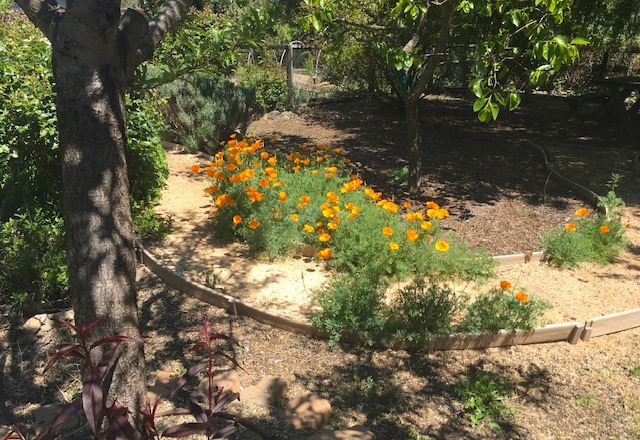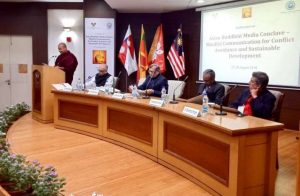
In the cool morning air, the golden poppies are beginning to stir. They stretch, twirl open, and turn their bright orange faces toward the sun. The back yard is awash in orange and green. When the weather turns cold, or it’s getting dark, the flowers curl themselves back up in tight swaddles only to unfurl again when conditions are kinder. This plant activity is called nyctinasty. Scientists are not certain why some flowers close and open like this, but they have a few theories. Charles Darwin believed that plants close up at night to reduce their risk of freezing. Another theory is that they are conserving energy, and perhaps their fragrance, for the daytime when pollinating insects are most active. Whatever the reason, the movements of these little flowers have something to share with us about living gracefully during the pandemic.
Our lives have become smaller, then larger, then smaller again. We never know when there’s going to be a new wave of the virus. We fold ourselves into our apartments, our family units, our friend units, our homes, and enter the mainstream with caution. We curtail many of our usual distractions, like going to the movies or eating out in lively restaurants, and miss seeing our friends in the meditation hall, church, or temple. When it looks like things are getting better we take off our masks and once again enjoy the faces of the people around us. Then another wave comes crashing down and we fold ourselves back up into our homes. We want there to be a linear trajectory, we want things to just get better. We see no end to this constant change.
The SARS-CoV-2 virus circling the world keeps morphing, with no end to its clever adaptations in sight. What’s around the next corner and when it will it end? No one can answer this question. It’s exhausting to constantly be expanding and contracting. But how much of this exhaustion is due to the act of expanding and contracting, uncertainty and adaptation, and how much of our suffering is due to our resistance to uncertainty and adaptation?
We have no control over the circumstances that require us to pull in or expand, just as the poppy has no control over the weather. But we do have control over how we respond to each new challenge. The Buddha taught that impermanence, and its natural effect of constant change, is an intrinsic part of life. Everything is impermanent. As practitioners of Buddhism we know this principle well. This gift of insight the Buddha so generously shared may lay dormant in our cabinet of sage advice. But the gift is meant to be taken out of the cabinet and used to help us navigate the expansions and contractions of our daily lives. By not expecting life to be predictable and stable we flow with the changes rather than creating more friction by resisting them.

In our Zen practice, we learn to let go of wanting life to be a certain way and simply observe what is present. When we meditate, rather than involving ourselves in commentary or trying to name or control each experience, we are aware of whatever is in the present moment. We watch the ache in our knee or itch on our nose with curiosity and openness. We settle our nervous systems and notice what is here, like watching a butterfly land on a leaf. We can then carry this state of mind off the cushion and into our everyday lives.
During this pandemic we don’t know from day to day when it will be safe to walk in the world. We wake up and listen to each day for our moveable choices. This may not be great for our business or social life, but it’s a real boon to our spiritual practice. We are being hurled into the koan, not knowing is most intimate, and asked to live that koan each day. We are invited to expand and contract like the poppy, our beautiful, golden teacher.
See more
Related features from BDG
Principles and a Pandemic: How Buddhism Helped Me Navigate Personal and Professional Lows
Exhaustion and Overwhelm
Facing the Challenges of COVID-19 Lockdown
In Pandemic Times: Reflecting on Futures and How Buddhist Values and Practices are Contributing














